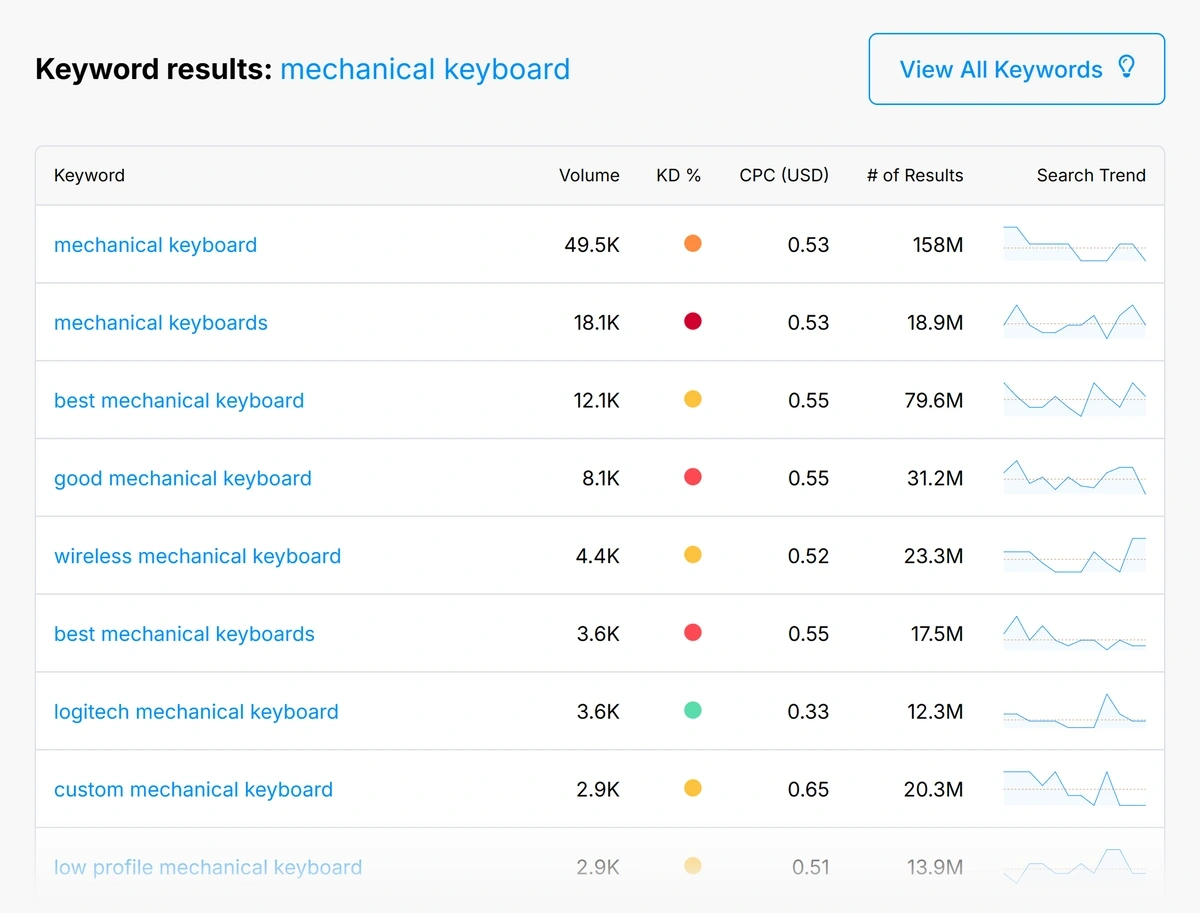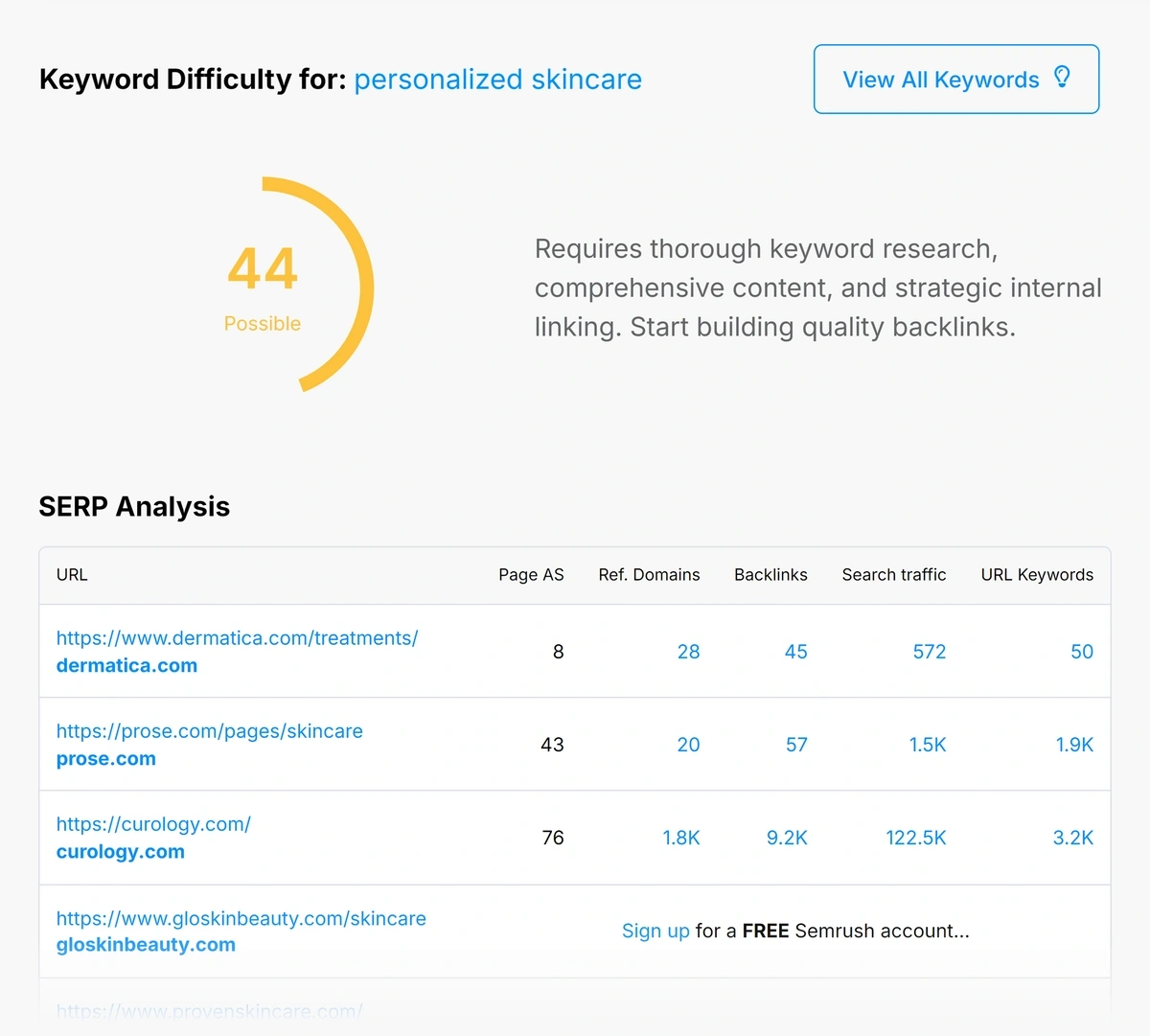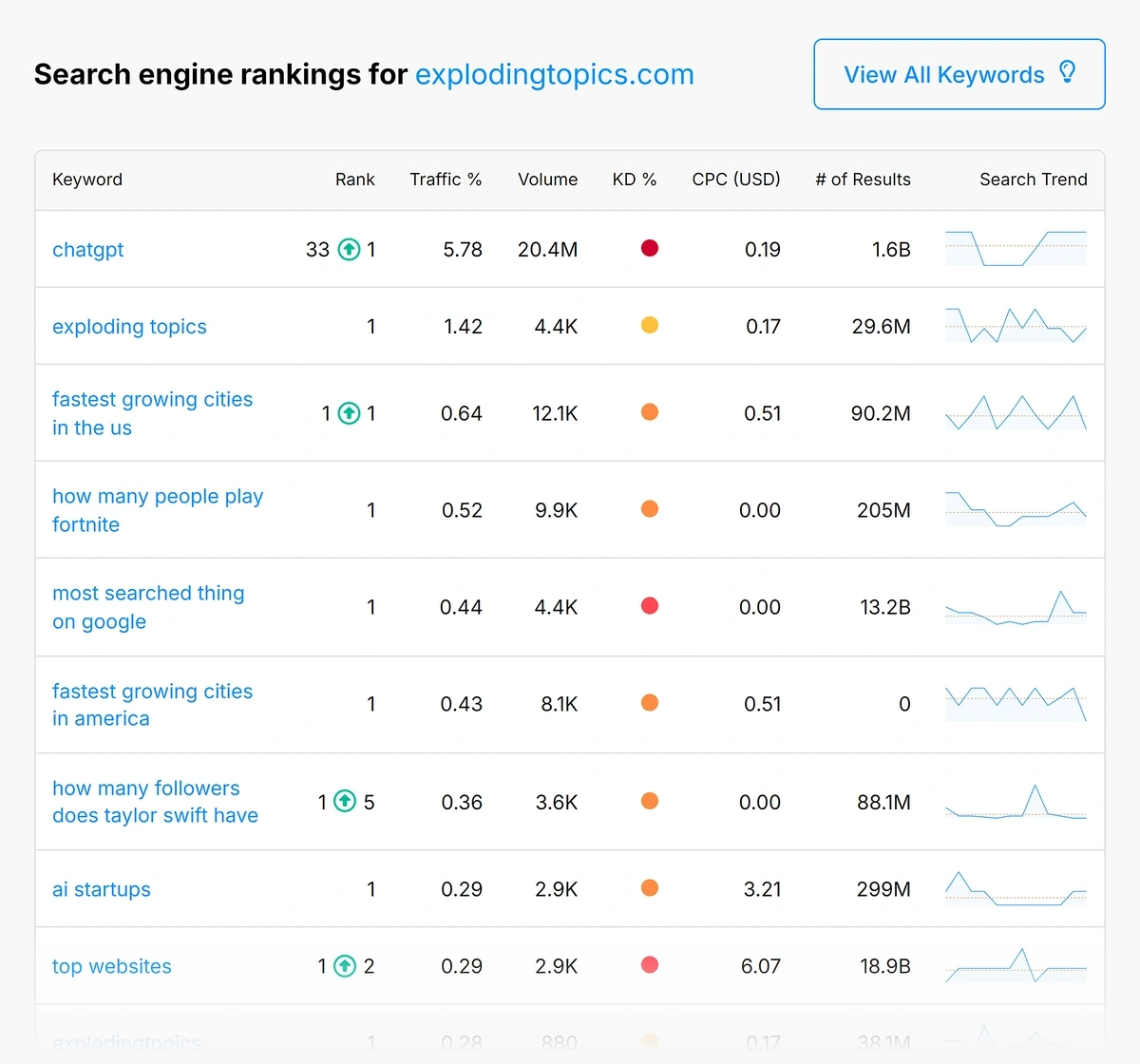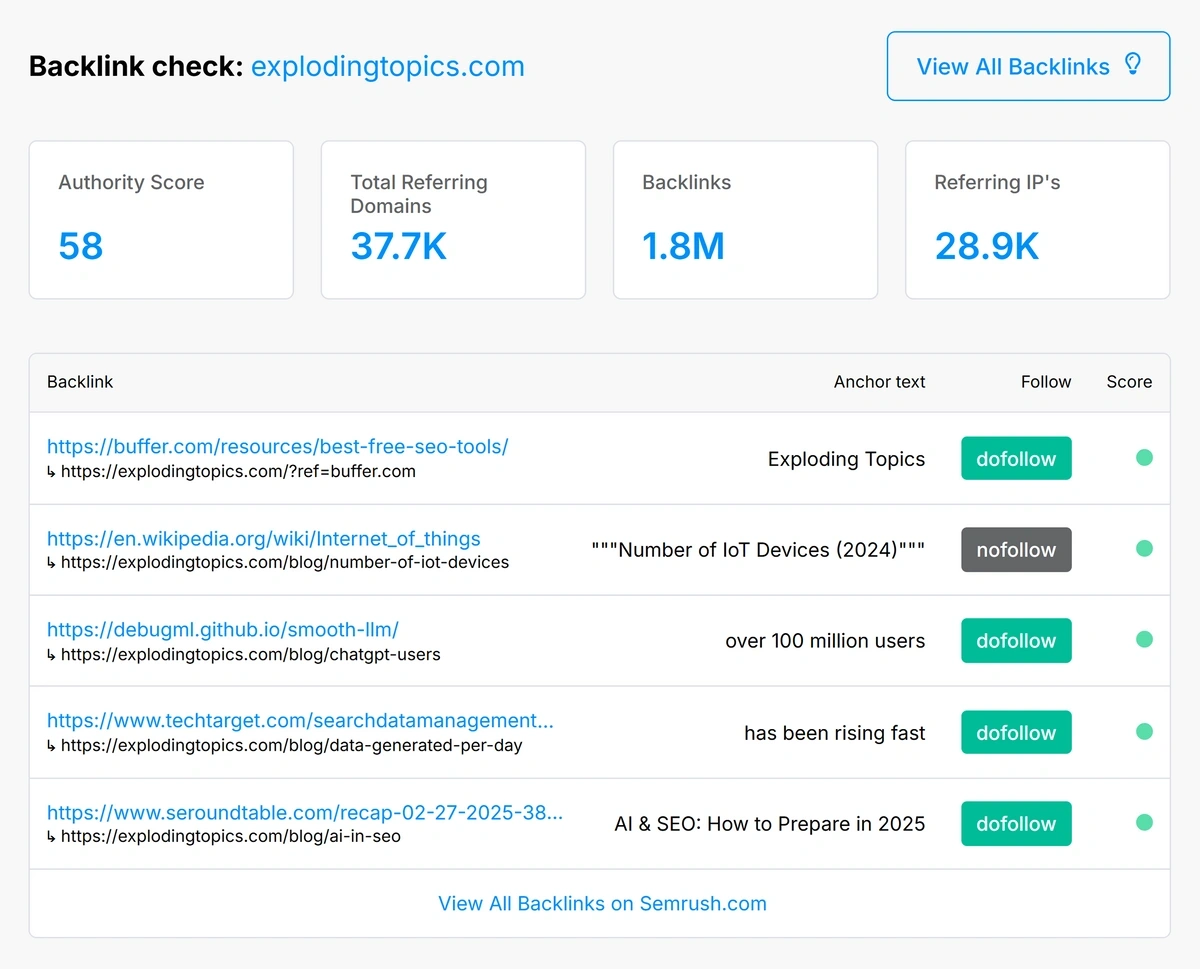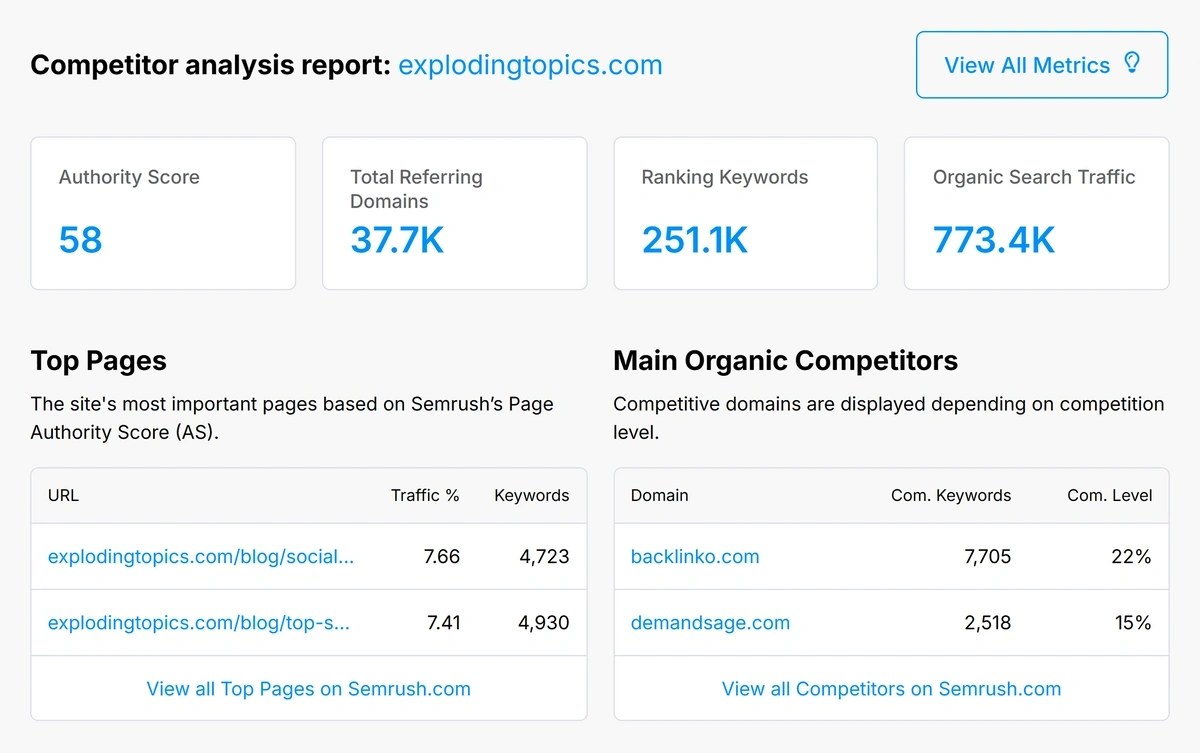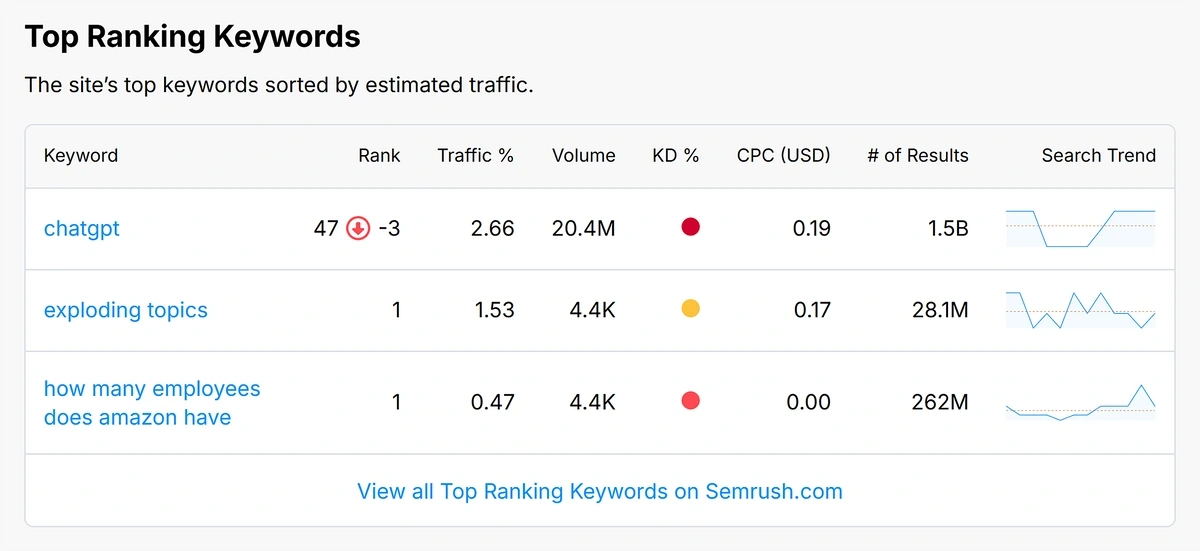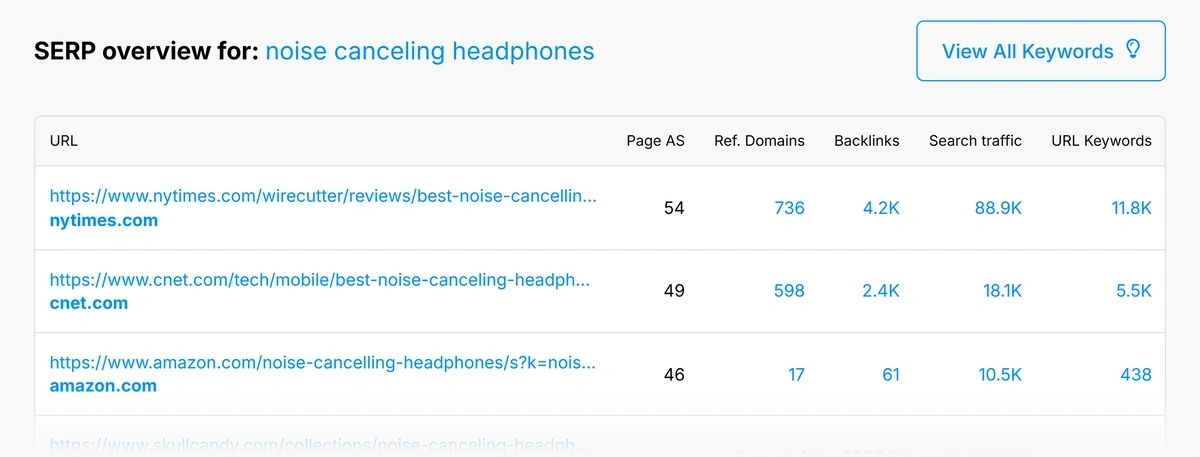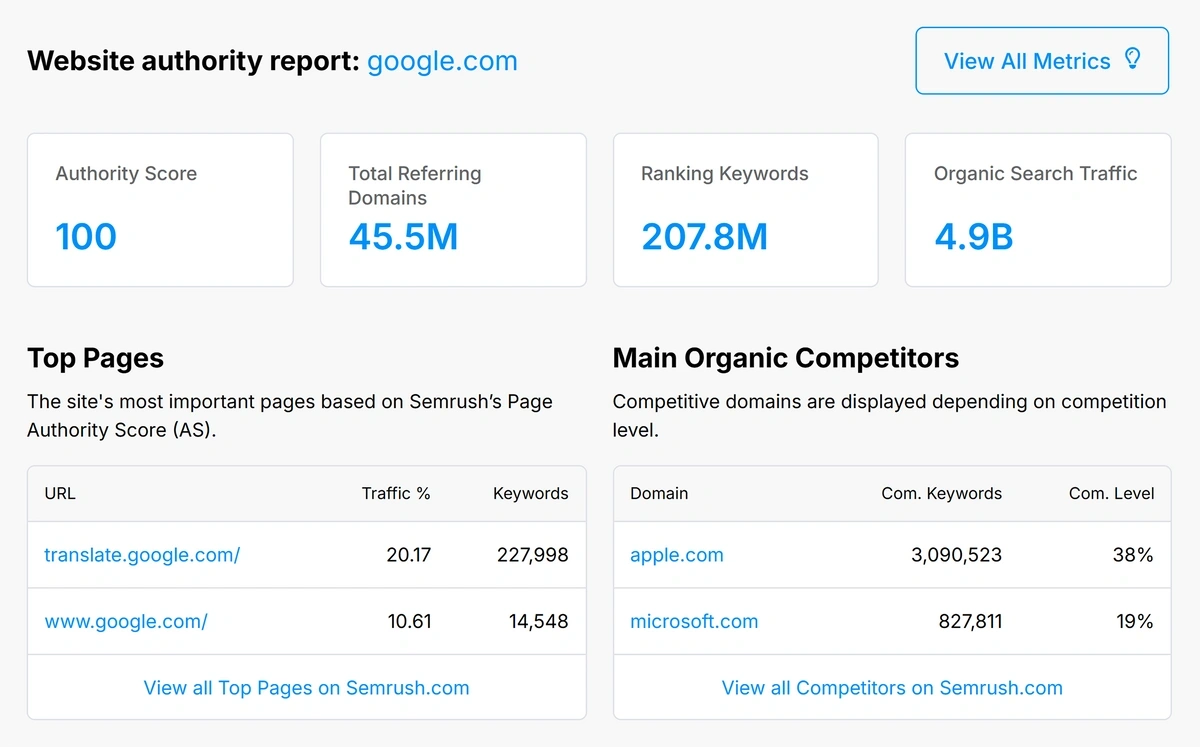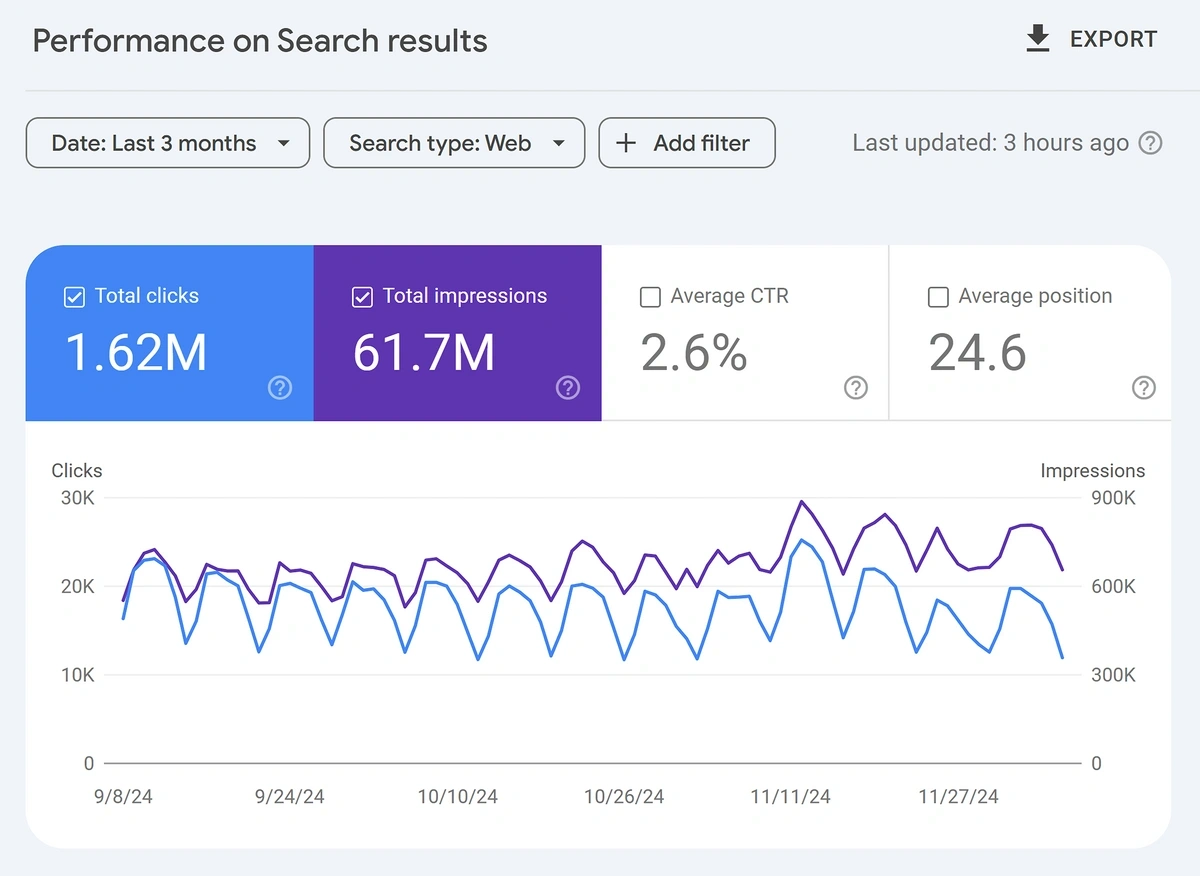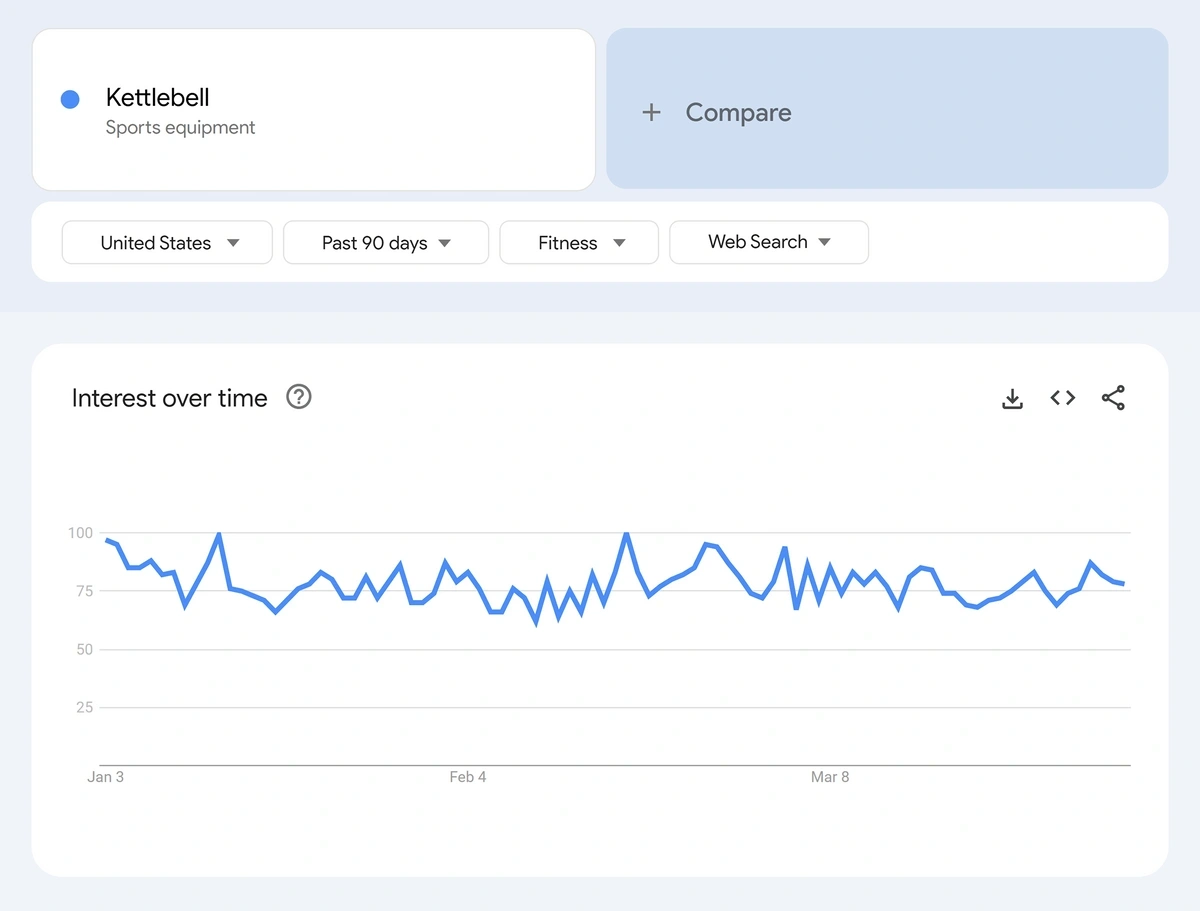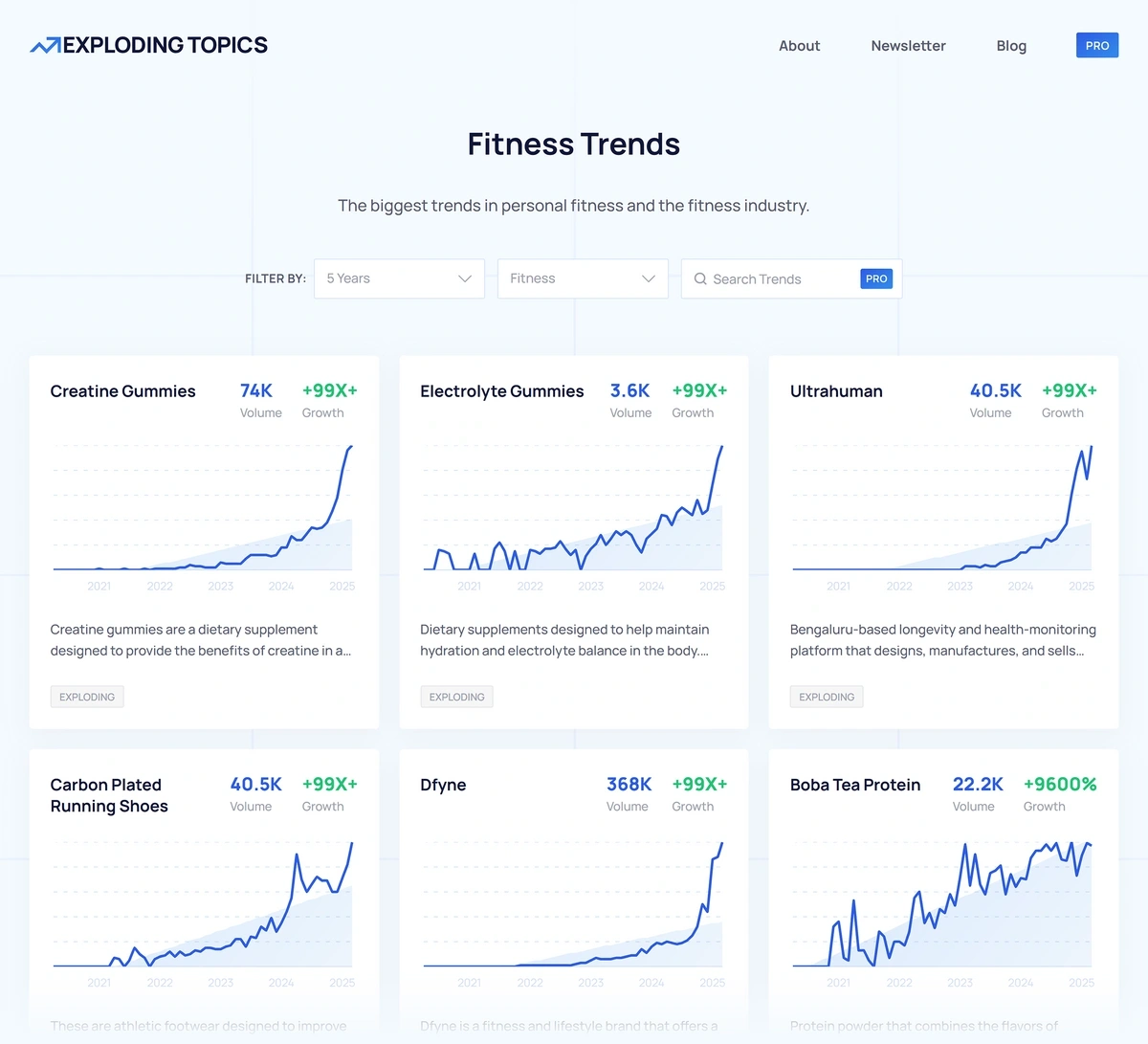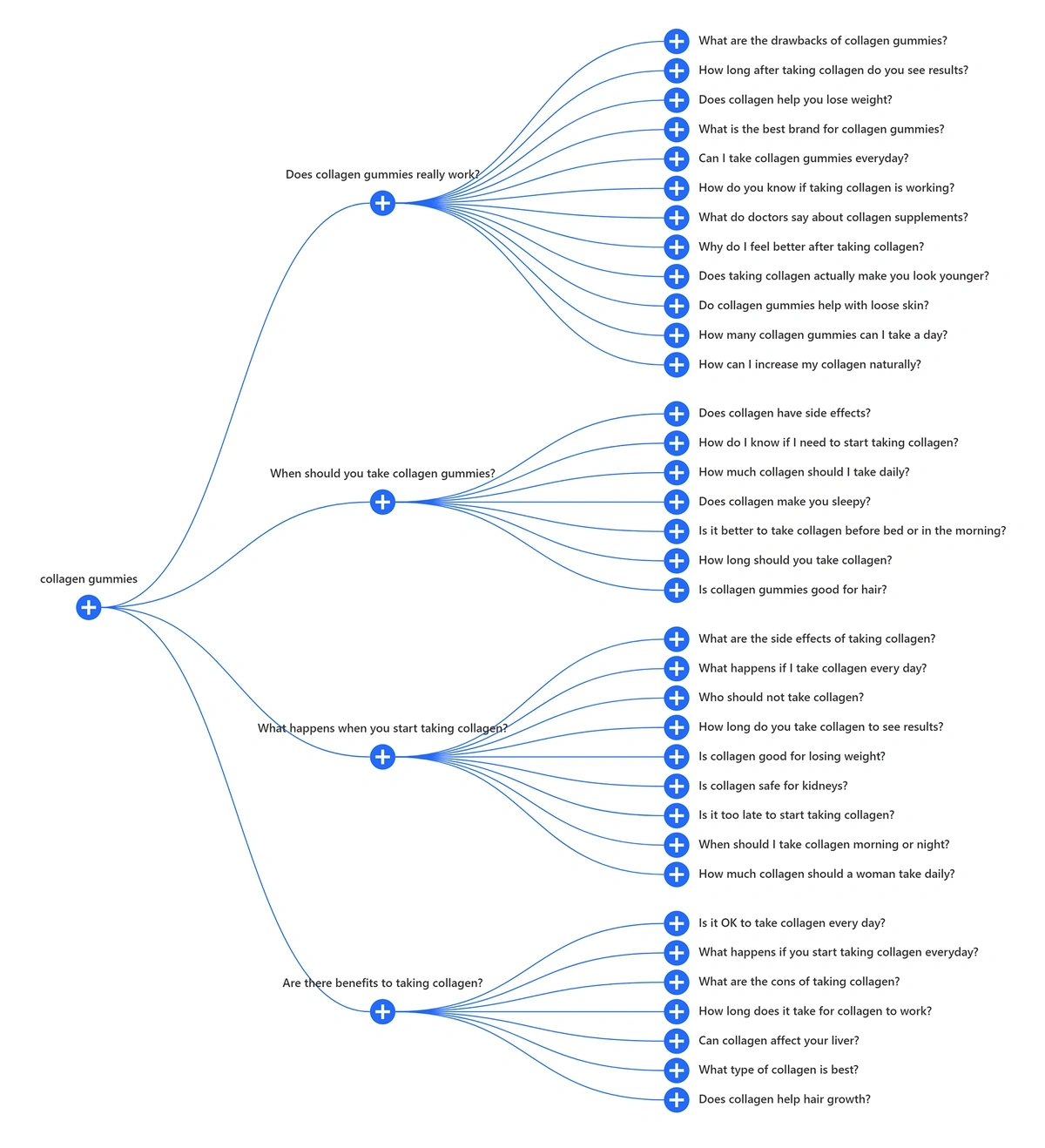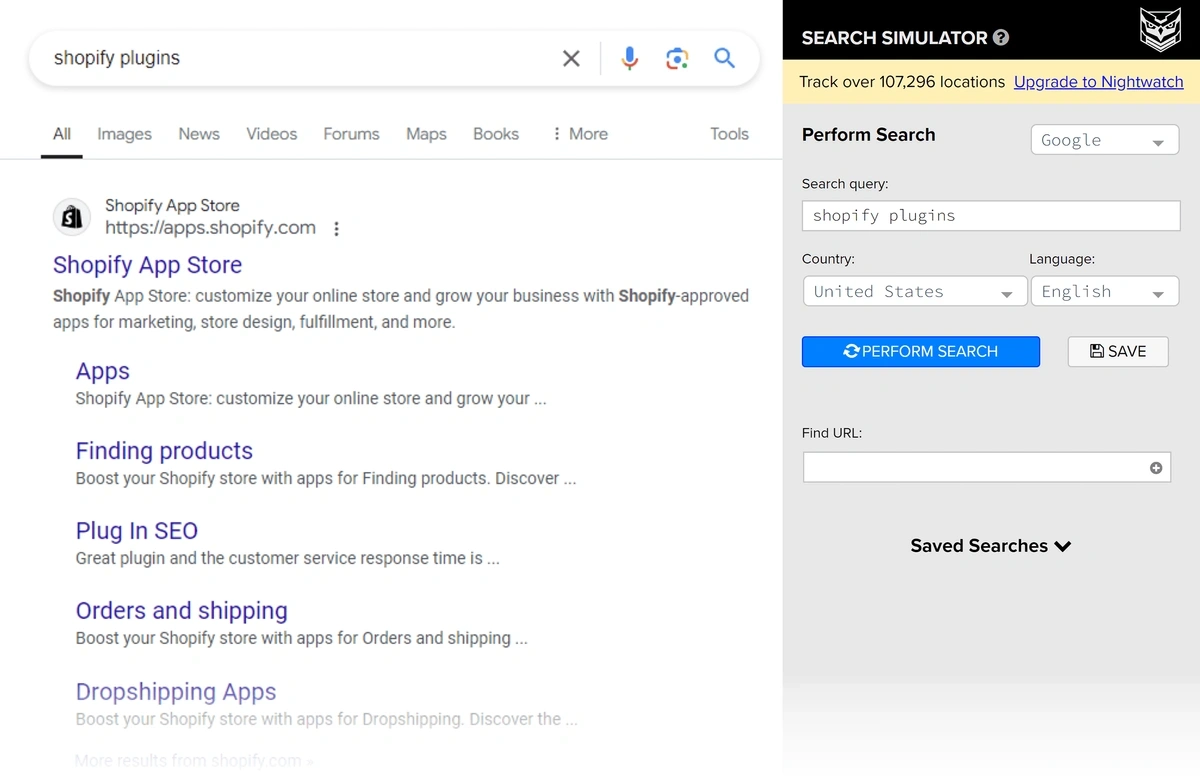
Free SEO Tools That I Use to Rank in 2025
When you’re working on real SEO projects with the pressure of delivering results, you need comprehensive tools without restrictions blocking you.
And if you can afford to pay for tools, that’s always the best option.
That said, I recently lost access to almost my entire tool stack and all my subscriptions. I would’ve lost a very important client if I wasn’t able to use free SEO tools to bridge the gap.
I’m writing today’s post with a newfound appreciation for free tools because, as much as I hope what happened to me doesn’t happen to you, I know that my experience wasn’t unique.
With that, here are some tools you can use to perform some real SEO work free of cost.
My Favorite Free SEO Tools
As a personal preference, I only use free SEO tools that I know to be accurate. This is why I’ll start my list with free SEO tools created by our Exploding Topics team, which sources data from Semrush.
Semrush maintains one of the largest, highly accurate databases of keywords, backlinks, and other SEO data.
1. Keyword Research Tool
Best For: Keyword research and search trend analysis
If you need to perform quick keyword analysis without signing up or logging in anywhere, our free keyword research tool can be a life-saver.
All you need to do is to enter a seed keyword and hit enter. Within a few seconds, you’ll have a list of 20 solid keyword ideas with helpful long-tail variations.
You get more keyword data with this tool than most of the other free options I’ve tried. It gives you:
- Exact keyword volume
- Keyword difficulty score
- Cost-per-click (CPC)
- Number of indexed results on Google search
- Search trend
Why I Like It
The best SEO strategies are based on solid keyword research. And our keyword research tool helps you make informed decisions about which keywords you should be focusing on.
For example, it shows you a mix of high, medium, and low difficulty keywords.
That means you can find your best opportunities simply by picking the keywords with a low KD% (indicated with a green icon) and a healthy volume.
You can also often find some niche keywords that are rising in popularity by looking at the search trend.
In my experience, writing on topics that competitors haven’t caught on to yet is one of the most powerful ways to obtain a clear advantage and stay ahead of the curve.
2. Keyword Difficulty Checker
Best For: Estimating difficulty and SERP competitiveness of a keyword
When you have a definite keyword you’re planning on targeting, you can go one step further in your analysis by using the free keyword difficulty checker.
This tool shows you the exact difficulty level of a keyword (based on Semrush calculations). Plus, it reports some key statistics for the top-ranking pages on SERP to estimate ranking potential.
Go to the tool page and simply enter your keyword.
It will pull the difficulty estimate along with a SERP analysis that you can use to decide whether you should prioritize the keyword or pick an easier one.
Why I Like It
This free keyword difficulty checker makes analysis easier because it doesn’t just report the difficulty level.
It also shows helpful metrics about pages that are already appearing on the top of search results for the target keyword.
Here’s how these metrics can assist your SEO decision-making:
- Authority Score (AS) shows you how strong the top-ranking domains are
- Ref. Domains and Backlinks reveal if you’ll need a proper link building plan
- Search traffic highlights how much traffic you can expect if you grab the top positions
- URL Keywords tells you the number of other related queries the same pages are also ranking for.
Overall, I find this tool much more helpful when I use it alongside the keyword research tool.
With the first tool, I can discover ideas for keywords worth targeting.
In the next step, I enter the shortlisted keywords into the difficulty checker to estimate my chances of ranking high.
I can also get some idea of the kind of traffic I can bring if I rank near the top.
From that point, it’s really easy for me to pick keywords with the best balance of difficulty level and traffic potential.
3. Keyword Rank Checker
Best For: Viewing current rankings for your top-performing keywords
Knowing which keywords are bringing the lion’s share of traffic to your site is half the battle in SEO.
The free keyword rank checker tool lets you enter your domain URL and shows you rankings for your best keywords and how traffic is distributed between them.
Why I Like This Tool
When planning content updates, the traffic percentage helps prioritize which pages to improve first, especially if you later lose their rankings after a Google update.
You’ll have a clear idea of what the traffic potential of some of your previous top-performing pages is like.
I also like seeing KD% of my best keywords.
If you have a good amount of high difficulty keywords ranking, it’s an indication for your site’s potential for success when targeting challenging keywords.
4. Backlink Checker
Best For: Gauging backlink profile of a domain
In my experience, chances of gaining top positions for competitive keywords are usually pretty low unless you have a good amount of quality backlinks to boost your page up.
The free backlink checker tool reports helpful metrics that enable you to gauge how strong your backlink profile is.
To use it, enter the URL of your root domain.
You can immediately take a look at your backlink report to find out how many backlinks your domain has.
It’s even more valuable when you check your competitor’s backlinks with this tool as well. That way, you can clearly see the gap between you and your competitors.
Why I Like This Tool
Typically, you’ll need much more info than what this free backlink checker shows you. And yet, you can still learn a great deal here, with the snapshot neatly summarizing your:
- Authority Score
- Referring Domains
- Backlinks
- Referring IPs
- The strongest URLs linking back to you
- Anchor text and the link’s follow status.
So if you don’t already have a way to check your strongest backlinks yet, this tool is a great place to start.
To get more out of this tool, don’t limit your analysis to only your website. You can also check backlinks of your competitors and discover their best links and the anchor texts they’re using.
This can give you ideas for popular topics you can write with backlink potential.
You can also use our tool to compare your Authority Score and overall backlinks with competitors.
5. Competitor Analysis Tool
Best For: Evaluating competitor positioning in organic search
Our free competitor analysis tool combines parts of reports from other tools I’ve mentioned above. So in addition to metrics like Authority Score and Referring Domains, it also highlights:
- Total ranking keywords
- Organic search traffic
- Top pages in terms of Authority Score and traffic
- Organic competitors
Taken together, this info enables you to see how many keywords your competitors are ranking for. You also get an estimate for their organic traffic.
You just have to enter a domain name to generate a competitor research report with this tool.
Why I Like This Tool
Knowing which competitors are surpassing you in terms of traffic and keywords is important.
Once you obtain that intel with this competitor research tool, you can focus on your top competitors and analyze them deeper.
Chances are you’ll understand the strategies they’re using to grow and maintain traffic consistently.
The Top Pages table is another useful section where you can discover the pages driving a significant percentage of your competitor’s traffic. It may be an idea for a new topic that you might not have covered yet on your site.
Scroll down further, and you’ll find a shorter version of the table revealing the top ranking keywords.
Note: Use the Keyword Rank Checker to see a larger list of top-ranking keywords for a domain.
It’s also super helpful to see the 12-month trends for referring domains and backlinks for a domain. If you see a rising trend, it’s a sure sign that your competitor is working hard on building links.
How should you respond in that scenario? Start thinking seriously about your own backlinking strategy so you can retain your competitive advantage.
6. SERP Checker
Best For: Viewing the first page SERP overview for a keyword
The SERP Checker accepts the keyword you want to look up in Google and shows you a ranked list of the pages appearing on the first SERP page.
Why I Like This Tool
It’s convenient for me to take a quick peek into the SERPs for a given keyword without personalization affecting the results on my browser.
Plus, you get a taste of how strongly the top pages are positioned.
Do they have high Authority Scores (AS) and tons of backlinks? Or can you spot some low AS pages there as well that might suggest there’s a chance for less strong domains to rank as well?
This tool is great for uncovering insights like these at a glance.
7. Website Authority Checker
Best For: Checking Authority Score for a website and related key metrics for a domain
Website authority is one of the strongest ranking factors that Google considers. With the free website authority checker, you can enter your domain URL to see your website’s Authority Score.
You can also check the Authority Score of your competitors by entering their domain.
Why I Like This Tool
I recently used this tool to compare the Authority Score and referring domains of a client’s website and 3 of their competitors, one-by-one.
It didn’t take me long to see that there was a significant gap, with my client lagging behind quite a bit in terms of backlinks and Authority Score.
So despite the limitations, this tool can help you see exactly where to put your SEO efforts to catch up with competitors.
Other Free SEO Tools I Use Frequently
Free tools work best when used in combination with other free tools. I recommend the following tools for anyone doing SEO regardless of your experience level.
6. Google Search Console
The Google Search Console (GSC) gives you a clear visibility into your search traffic trend with a simple time-series chart.
Unlike advanced tools, GSC makes it easy to evaluate the impact of a recent algo update simply by comparing changes in clicks, impressions, and positions between two time periods.
Besides, all this data comes straight from Google so you know it’s accurate.
Instead of just working with metrics like keyword volume, you can check the actual number of clicks and impressions that you’re getting from queries you’re already ranking for.
It also helps you discover keywords that are getting impressions but not drawing enough clicks.
Usually, this is a sign that your page might not be optimized well enough for that particular query.
GSC is a part of my daily work routine. It’s how I keep a check on search performance for my websites and discover gains and losses in traffic.
7. Google Trends
There are a couple of ways to use Google Trends to uncover trending topics and search queries:
- Look for trending queries in a specific category with a blank search
- Enter a specific search term to see its popularity and related topics
For example, if you have a fitness website, you can select the Fitness category and narrow down your search by using the time frame, country, and search type filters.
Google Trends is great when it gives you those “aha” moments, when you discover super relevant searches that are trending in your niche.
But these moments are rare.
The problem is that Google Trends is afflicted by too much noise.
Certain queries associated with celebrity news, sporting events, and hot current affairs frequently dominate the suggestions Google Trends will give you.
These aren’t all that useful for SEO unless you’re in the media publishing business.
That said, it’s always a good idea to spend a few minutes on Google Trends every time you’re planning topics to write for the month (or the quarter).
Pro Tip: I usually find better ideas hiding deeper in the list of the Search Queries table. You can click the right arrow button underneath the table to view additional queries that might be more relevant to you.
8. Exploding Topics
Compared to Google Trends, Exploding Topics is better at surfacing new topic or product ideas.
There’s one area where I find Exploding Topics genuinely more helpful than Google Trends: its ability to cut through the noise.
Where Google Trends data is so often polluted by completely irrelevant queries, Exploding Topics excels at finding real topics that strongly match your selected search category.
To take an example, I used the same Fitness category in Exploding Topics to see what I can find.
The first thing you’ll notice is that the results are completely free of any junk queries.
At the same time, Exploding Topics shows you relevant topic ideas that Google often misses unless you know the right search term to enter.
I turn to Exploding Topics more frequently now as a Google Trends alternative whenever I’m in need of topic ideas capable of driving tons of traffic.
9. AlsoAsked
AlsoAsked finds People Also Ask data from Google and organizes these questions by search intent.
It’s a fantastic tool for topic research because it helps you find the right questions you should be answering in order to fulfil searcher intent.
The tree diagram makes it easy to understand the relationship between different topics.
I find AlsoAsked quite handy for niche, long tail queries.
These queries don’t have enough volume to be detected by most keyword research tools.
But they can still help you create content outlines aligned with audience paint points that your competitors might be missing.
You can run 3 searches per day in the free version.
Pro Tip: You can use AnswerThePublic along with AlsoAsked to find highly specific long tail queries. First, enter a broad keyword in AnswerThePublic. Then, pick a question from the suggested data and enter it in AlsoAsked to discover more insights about the long-tail query and its topical relationships.
10. SEO Search Simulator by Nightwatch
Nightwatch simulator is a simple Chrome extension that shows you the search results for any query based on your selected region.
How is this different from simply searching a keyword directly in Google? The extension essentially bypasses personalization in your browser to give you an objective picture of the SERP for your query.
Besides, you can easily switch between different locations by using the country dropdown and see the SERPs from your selected region.
This eliminates the need to use a VPN for location-specific search results on Google.
Simplify SEO With Actionable Free Tools
Free SEO tools can be super valuable despite their limitations. You’ll get the best results if you pick the right tool for the task:
- Keyword research tools to identify topics
- Difficulty checkers to assess competition,
- Competitor research to get an overview of your SERP competition
- Backlink analyzers to understand your site's authority.
Remember, effective SEO isn't always about having the most expensive tools. It's about being resourceful, asking the right questions, and knowing where to find reliable answers.
I still recommend using premium SEO tools for daily SEO tasks once you start to gain traction. Paid tools will save you more time and enable deeper analyses with fewer limitations.
Stop Guessing, Start Growing 🚀
Use real-time topic data to create content that resonates and brings results.
Share
Newsletter Signup
By clicking “Subscribe” you agree to Semrush Privacy Policy and consent to Semrush using your contact data for newsletter purposes
Written By


Osama is an experienced writer and SEO strategist at Exploding Topics. He brings over 8 years of digital marketing experience, spe... Read more

